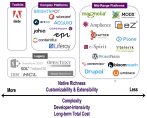On RedDot and Balance
Last week we received an e-mail from an IT staffer at an outfit that is looking to buy a Web CMS tool, with PaperThin's CommonSpot and RedDot CMS (part of the extended Open Text family) under particular consideration. The e-mail was a forwarded message from a RedDot salesperson, excerpting significant pieces of our Web CMS Report 2008 to make CommonSpot look bad and RedDot look good.
This is an explicit violation of our no-commercial-use policy, which forbids vendors or anyone else from using our findings as marketing material (our policy is modeled after that of the famous U.S.-based evaluation service, Consumer Reports). Somebody or some bodies at RedDot clearly took a lot of time to either OCR or re-type the text (you can't copy-paste from the PDF). They then took a lot more time to extensively -- if quite disingenuously -- redact portions of the text to make it look like we love their product (we don't) and dislike CommonSpot (we don't). I imagine other RedDot competitors were lined up and chopped down in similar fashion.
Consider the following excerpt from the RedDot salesperson's 4-page message:
- "Open Text also holds a yearly LiveLinkUp conference for all of their customers and partners,... You can also find regional user groups around the world, an annual international summit, and an online developer community."
And our actual report text with the redacted clause italicized:
- Open Text also holds a yearly LiveLinkUp conference for all of their customers and partners, although RedDot customers we met there departed wondering where their web publishing needs fit in among the enterprise-focused Open Text strategy. You can also find regional user groups around the world, an annual international summit, and an online developer community.
Or this from the e-mail:
- "...the product is mature, with a large customer base (over 2,500) and significant internal and external consulting expertise for customers to tap, plus a modestly active user community..you would buy it from a well-regarded vendor, Open Text, with a solid (if complex) "ECM" strategy..."
Which is really this in the report:
RedDot may lack the R&D energy of an Interwoven, Tridion, Day, or Sitecore, but the product is mature, with a large customer base (over 2,500) and significant internal and external consulting expertise for customers to tap, plus a modestly active user community.
And yet, RedDot average deal sizes continue to grow. We think this reflects more the cachet and customer expectations surrounding working with a major ECM vendor like Open Text, rather than intrinsic improvements to the core product -- which indeed have been rather slow in coming. Indeed, for what you get -- a somewhat dated mid-marketish toolset -- RedDot cannot be a called a great value. Nevertheless, you would buy it from a well-regarded vendor, Open Text, with a solid (if complex) "ECM" strategy.
The hatchet job on CommonSpot was as bad or worse.
Now, you and I both know that software sales can be a hurly-burly sport. Caveat emptor and all that. And we've all seen vendors distill convenient quotes from analyst reports across the spectrum (though, disappointingly, often with those analyst firms' approval). What's a bit startling here, though, is the depth of the dishonesty behind the very many ellipses. Although possibly the work of a rogue sales exec, it would seem to confirm my growing suspicions over the years that RedDot as a company has a tendency to play it rather fast and loose.
This makes RedDot all the odder fit within Open Text, an ECM vendor that -- whatever its shortcomings -- has always maintained a conservative, lower-key reputation in the face of the Oracles of this world. In fact, you can really feel the distance within Open Text (c.f., the LiveLinkUp meeting mentioned above), as if Open Text considers RedDot a sometimes charming younger sibling whose misdeeds are ultimately an embarrassment to the family name. It's too bad, really, because RedDot customers probably lose out in the end.
The larger issue here, though, is the way you look at software. Software development is really about trade-offs. Unless we all start managing our websites exactly the same way, something that works well in a tool for one customer can be a detriment for another customer. Do not seek to discover whether a software product is "good" or "bad." Ultimately you have to take a tougher but more meaningful measure: is that product a good fit for what you're trying to accomplish.
This means that every time an analyst or consultant praises some product feature, you have to ask yourself whether, in your case, that feature is actually a demerit -- and vice-versa. A more balanced view of the products -- and your needs -- can get you to the right solution.








